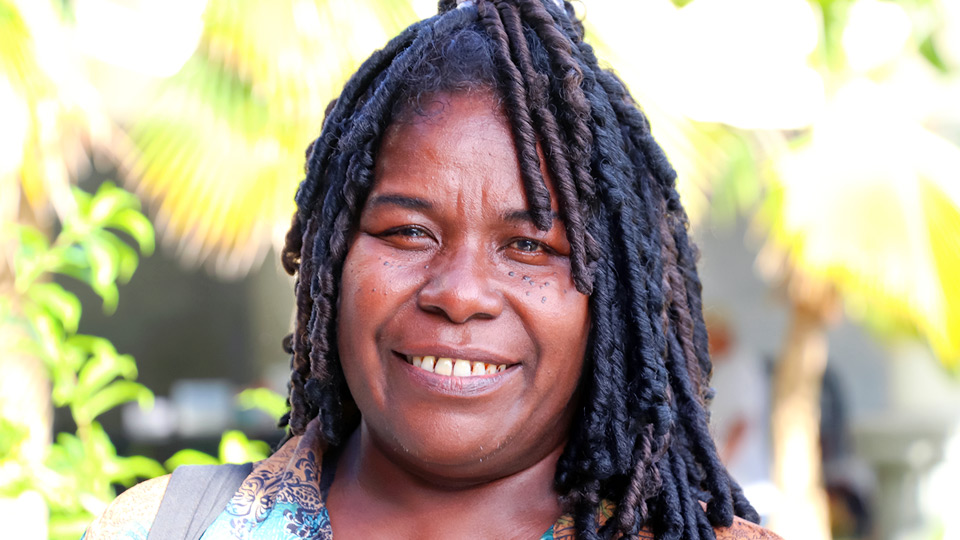In the words of Nanette Panda: “Women’s voices must be heard and respected because women should have a right to speak to an issue that directly affects them.”
Date:
Author: Anastasiia Tiurmenko

This is a series of articles from the Inclusive Governance of Natural Resources (IGNR) project, the heroines of which are local leaders who participated in the Traditional Governance and Facilitation Bill consultations organized by the IGNR project this year.
The Traditional Governance and Facilitation Bill was introduced by the Democratic Coalition for Change Government in 2017. The Bills and Legislative Committee’s (BLC) withdrew the Traditional Governance Bill due to the lack of consultations with the Solomon Islands Bar Association, Civil Society Organizations, Churches, women and youth in the country. A series of consultations are now being held by the IGNR Project to raise awareness among these groups, especially local leaders, women and youth.

My story begins with my tribe. I was chosen to represent my people on some legal issues with regards to land at the Chiefs hearing at the tribal level in local courts and the High Court. Over time, I realized I want to know more so I could contribute more and represent my tribe and my people everywhere.
And so, it all began. I became a member of the Western Province Council of Women joining the Council as an individual member through the women’s business sector. From my first day on the Council until now, my passion to help women and support the improvement of women’s lives has grown. The more I participate in workshops and trainings on women’s empowerment, gender equality and capacity building, the clearer I began to understand that my duty was to advocate for women’s rights especially in consequence of cultural and traditional challenges. After being nominated as a Caucus member for Western Province, I have decided to dedicate my time and life to women’s empowerment.
Being a member of the Caucus has allowed me to work with decision-makers and to advocate for women’s rights at the level of decision-making, especially at the provincial level. Even though we are only a small advocacy group, we have been able to effectively push for recognition of women at the level of decision-making at the provincial level through the Temporary Special Measures.
Around 80 per cent of people in the Solomon Islands live in rural areas and these are the people who use the land and natural resources in their everyday life. Therefore, their voices must be heard. Nonetheless, women’s voices must be heard and respected because women should have a right to speak to an issue that directly affects them. Since women make up half of the population and their life experience is different from men’s one, we must ensure that they will be involved in negotiation and decision-making processes.
Furthermore, women from Western Province come from a matrilineal society, and we believe women are custodians of the land and therefore women’s voices are crucial and must be heard at all levels, especially for the future generation. At the same time, this is the most common challenge women from Western Province face daily – to have equal power in leadership and decision-making across all levels of government. Even now, as a woman, I am recognized at the tribal level but when it comes to development and decisions over management of natural resources, I’m being left behind. That is why we must fight for the recognition of women’s equal status with men and legal and policy reform across a range of issues, including land and inheritance.
Education is the key to solving this challenge. Consultations should include a dialogue with communities to capture their real experiences to improve policies. We should learn how to make laws and politics more inclusive, hence, to capture women’s voices and experience. At the end of the day, it is the equal involvement of men and women that will help us build resilient and inclusive communities.
Contact information:
Anastasiia Tiurmenko
Communications Specialist – Inclusive Governance of Natural Resources Project
UNDP Solomon Islands | Email: anastasiia.tiurmenko@undp.org | Tel: (+677) 274 46
![[Partner logos]](/sites/default/files/Field%20Office%20ESEAsia/Images/2020/12/fj-partners-logo-960px.jpg?h=108&w=432)
The article is prepared within the Inclusive Governance of Natural Resources (IGNR) project implemented by UNDP Solomon Islands and UN Women Fiji Multi-Country Office, funded by the UN Peacebuilding Fund to support and empower local women of the Solomon Islands to ensure their participation in the decision-making processes.